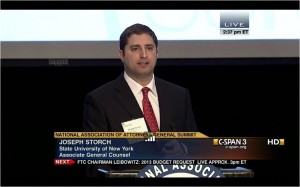Last week, SUNY Associate Counsel Joseph Storch was invited to speak about campus online piracy at the National Association of Attorneys General spring meeting.
As SUNY Associate Counsel, Storch provides legal advice to SUNY Cortland, SUNY Oswego and SUNY Institute of Technology and chairs the Student Affairs Practice Group. He graduated from SUNY Oswego and Cornell Law School and is currently completing his Masters in Public Policy at the University at Albany.
 Due to his specialization in digital copyright and intellectual property, Storch was invited to be part of an Intellectual Property Panel on campus online piracy at last week’s National Association of Attorneys General spring meeting. Other members on the panel were former Senator Christopher Dodd, the Motion Picture Association of America’s chairman and CEO; Richard Cotton, NBCUniversal Media LLC executive vice president and general counsel; and Larry Conrad, UNC’s information technology vice chancellor and chief information officer. When asked about being invited to speak on the panel, Storch said he felt honored to be invited to speak with such esteemed panelists as Senator Dodd, Richard Cotton and Larry Conrad.
Due to his specialization in digital copyright and intellectual property, Storch was invited to be part of an Intellectual Property Panel on campus online piracy at last week’s National Association of Attorneys General spring meeting. Other members on the panel were former Senator Christopher Dodd, the Motion Picture Association of America’s chairman and CEO; Richard Cotton, NBCUniversal Media LLC executive vice president and general counsel; and Larry Conrad, UNC’s information technology vice chancellor and chief information officer. When asked about being invited to speak on the panel, Storch said he felt honored to be invited to speak with such esteemed panelists as Senator Dodd, Richard Cotton and Larry Conrad.
The panel gave both the entertainment industry and universities a chance to share their perspective on file sharing on university and college campuses. In his presentation, Storch recalled the phrase engraved above the Moot Court bench at his law school, “the Law Must Be Stable, and Yet It Cannot Stand Still” in arguing that, “[s]ociety has changed and copyright law must be strong, but it also must advance. Higher Education and the entertainment industry can partner in exciting and innovative ways to protect intellectual property while providing a myriad of legal and appropriately priced options to our students.”
He urged the entertainment industry and attorneys general to work with colleges to identify and encourage lawful alternatives that can be made available to college students at economically appropriate prices, arguing that, instead of simply looking towards deterring and punishing piracy, we can, “find creative and efficient methods for higher education to comply with the law and for the entertainment industry to protect its intellectual property. SUNY understands this all too well. Our University does a billion dollars in sponsored research each year, and our faculty and students create untold amounts of copyrighted material. Intellectual property is as crucial to the mission and future of the State University, its faculty and students as it is to members of the entertainment industry.”
In April, Storch will join with representatives of Cornell, UCLA, the University of North Carolina, Princeton, the University of Chicago and others in a forum sponsored by EDUCAUSE, where higher education officials will sit down with representatives of NBCUniversal, Disney, Time Warner, the MPAA, the RIAA, and MovieLabs to continue a constructive dialogue about digital copyright.
To watch video of the panel, click here.
For more information on SUNY’s peer-to-peer file sharing policies, click here.
To read Joe’s article on peer-to-peer file sharing, the Digital Millennium Copyright Act and the Higher Education Opportunity Act, click here.

